
Books

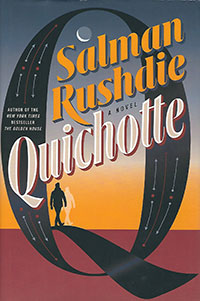 “Quichotte” (400 pages; $28) by Salman Rushdie; published by Random House (www.randomhousebooks.com)
“Quichotte” (400 pages; $28) by Salman Rushdie; published by Random House (www.randomhousebooks.com)
Patience, a heck of a lot of it. That’s what you need when you are reading a Salman Rushdie novel. With his latest “Quichotte,” you will need even more. Homage to Cervantes’ classic “Don Quixote,” this comes with a subplot, a plot within a plot, so to speak. So we have a Bombay native Quichotte, a single, genteel but confused salesman who is deeply in love with a Miss Salma R, an Indian actress-turned-Oprah-esque talk show host. Along with his teenaged imaginary son Sancho, he sets off in a Chevy Cruze on a picturesque journey across America to prove worthy of her hand. Quichotte is the creation of spy fiction writer and another Indian Sam DuChamp, who is looking to reunite with his own estranged sister. It appears Rushdie with all his finesse at magical realism, hyper-meta storytelling and absolute absurdity, is willing to take on just about any topic or make one up: opioid epidemic, racism as in white supremacy, life, death, technology, religion, reality TV, sci-fiction, satire, talking crickets and believe it or not mastodons. “There once lived at a series of temporary addresses across the United States of America, a traveling man of Indian origin, advancing years, and retreating mental powers, who, on account of his love for mindless television, had spent far too much of his life in the yellow light of tawdry motel rooms watching an excess of it, and had suffered a peculiar form of brain damage as a result,” so begins the novel. And it is till the very last page that the master storyteller Rushdie keeps a grip on the reader. “Time, that lethal chamber of horrors whose walls close slowly in upon the luckless inhabitant until they crush the life out of him …” Now that is sheer brilliance.
 “Autumn Light: Season of Fire and Farewells” (248 pages; $25.95) by Pico Iyer; published by Alfred A. Knopf (www.aaknopf.com)
“Autumn Light: Season of Fire and Farewells” (248 pages; $25.95) by Pico Iyer; published by Alfred A. Knopf (www.aaknopf.com)
At the onset, we will confess Pico Iyer is our favorite travel author. His books about crossing cultures such as “Video Night in Kathmandu,” “The Lady and the Monk” and especially “The Global Soul” are treasures to be cherished forever. So is his latest venture, which begins with the author’s return to Nara, Japan after the sudden death of his father-in-law. Once the first permanent Buddhist capital of Japan, we read, as the author navigates the sleepy, old city of Nara, strolling the neighborhoods, Deer’s Slope and Slope of Light, Starbucks of course, a deer park, its post office and a bakery. Married to Hiroko, who has two children from a previous marriage, Iyer comes back to the country where he has had a home for 30 years in this part chronicle and part travel piece. “We cherish things, Japan has always known, precisely because they cannot last; it’s their frailty that adds sweetness to their beauty,” he muses while playing table tennis matches with the elderly (assigning intriguing names such as “Bodhisattva,:” “Charlie Brown,” “Wyrd Sisters” for easy identification) at a local club or experiencing “the reddening of the maple leaves under a blaze of ceramic-blue skies that is the place’s secret heart.” Going back and forth between yearly visits to Japan is a meeting with the Dalai Lama, who comforts Hiroko about the loss of her father. “Remember: Only body gone. Spirit still there. Only cover gone,” he tells her. Ever the philosopher himself, Iyer notes, “… I’d thought that autumn was the season that taught us how to die, only now do I see that in truth perhaps it’s dispensing the much harder challenge of learning how to watch everyone you care for die. Death can be hardest on the living.” This latest book is a poignant work of art that will leave you yearning for more from the author. As Iyer rightly says, “Autumn is the season when everything falls away.”
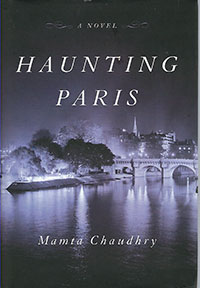 “Haunting Paris” (278 pages, $25.95) by Mamta Chaudhry; published by Nan A. Talese/Doubleday (www.nanatalese.com)
“Haunting Paris” (278 pages, $25.95) by Mamta Chaudhry; published by Nan A. Talese/Doubleday (www.nanatalese.com)
“Squandered time! The most enduring of regrets. In the end, a lifetime is not enough, the heart yearns for more. Who can reason with desire? The heart has its reasons that reason cannot know.” So notes lover Julien, a revenant, in this debut novel by Coral Gables resident Mamta Chaudhry, while watching his beloved Sylvie from beyond the grave. Set in 1989 Paris, the book takes us back to the horrors of World War II as Sylvie attempts to solve the mystery behind the disappearance of Julien’s sister and one of her daughters at Auschwitz. The transition between the two lovers, who were together for 30 years, is told extraordinarily well with the chapters for the deceased set aside in italics. “Why does one fall in love with one person and not another?” wonders Julien. “You might as well ask why this piece of music strikes a chord and not that one. Desire is a mystery the dead fathom no more than the living.” As the two lovers grieve, the yearning for unison again is pervasive. “After the span allowed to her by capricious Time, one day Sylvie will push open that curtained door to come to me, and despite all that I have known, at the sight of her I will finally believe all losses are restored and sorrows end.” For a debut author, Chaudhry has written a touching and powerful book, one that brings family secrets, longing, love, reprehensible crimes and sorrow to the forefront. “Haunting Paris” promises to ‘haunt’ you for a long time!
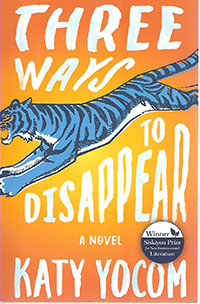 “Three Ways to Disappear” (310 pages; $18.95) by Katy Yocom; published by Ashland Creek Press (www.ashlandcreekpress.com)
“Three Ways to Disappear” (310 pages; $18.95) by Katy Yocom; published by Ashland Creek Press (www.ashlandcreekpress.com)
The year is 2000 and ex-journalist Sarah DeVaughan has returned to the habitat of Ranthambore National Park to help preserve the endangered Bengal tiger. India is also the place where Sarah, her elder sister Quinn (“Go save those tigers,” she had told Sarah) and the DeVaughan family had endured unspeakable disaster in their childhood. It was here that at the age of 7, Sarah’s twin brother Marcus died of cholera. But Quinn who is married (albeit, not happily) with twins stays back home in Louisville, Ky. “India was a hard place to live, a hard place to make anything change. A hard place to get past the tragic and the absurd,” recognizes Sarah while touring the tiger park. It isn’t long before the 32-year-old gets tangled in local politics and simultaneously falls in love with an Indian co-worker. Quinn, who isn’t too keen to visit the place of their childhood trauma, is convinced by her sister to make another trip. “Lately (Quinn) she has begun to think of the past as a vast place, dark and mysterious as a forest. Always decaying, collapsing in upon itself, only to bring forth new growth in the most surprising of places,” marks Yocom. The narrative, told in alternating views by the two sisters, but simultaneously highlighting the plight of the villagers and conservationists, has a fascinating plot that ends on a sad note. For a first-time novelist, Yocom has written a fine tale that embraces the majestic Bengal tiger on one side; and childhood trauma, marriage, family secrets, tragedy, forbidden love and compassion on the other.
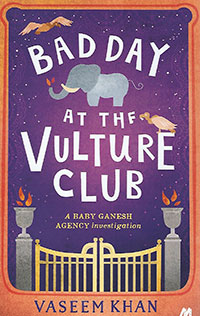 “Bad Day at the Vulture Club” (380 pages; $26.99) by Vaseem Khan; published by Mulholland Books (www.hodder.co.uk)
“Bad Day at the Vulture Club” (380 pages; $26.99) by Vaseem Khan; published by Mulholland Books (www.hodder.co.uk)
After “The Unexpected Inheritance of Inspector Chopra,” “The Perplexing Theft of the Jewel in the Crown” and “The Strange Disappearance of a Bollywood Star” comes another tale from Vaseem Khan. In the latest Baby Ganesh Detective Agency mystery series book, retired Inspector Ashwin Chopra solves the death of a wealthy and respected Parsee gentleman who is murdered on holy ground and his body dumped inside a Towers of Silence, where the Parsee dead are consumed by vultures. As always, he is aided by Baby Ganesh and ex-police colleague Rangwalla, who gets an intriguing sub-plot of his own. Then there is Irfan, former street urchin but now a bona fide Chopra family member. Not as visible as in previous books is Chopra’s charming wife Poppy, who has joined the Take the Poo to the Loo campaign to embrace the challenge of ending open defecation. She has put up a poster in the building complex depicting “a series of cartoons of an average-looking Indian man walking along the street, before stepping, with exaggerated disgust, into a pile of excrement.” This causes quite a ruckus, somewhat hilarious, with the president of the complex’s managing committee. Truly, Bombay, now Mumbai, comes back to life as in: “A shabby, twelve-storey tower in a rundown part of the mid-town Dadar district, the building, with its flaking grey walls, caged balconies, cheap advertising hoardings and thickets of snaking electrical and phone cables, looked severely ill, as if it had contracted some sort of debilitating architectural disease.” Our kudos go to Khan for yet another fascinating crime mystery. We eagerly await the next in the Baby Ganesh Detective Agency series.
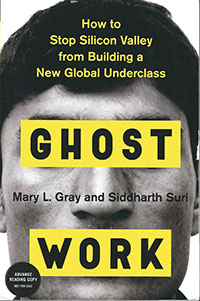 “Ghost Work: How to stop Silicon Valley from Building a New Global Underclass” (288 pages; $27) by Mary L. Gray and Siddharth Suri; published by Houghton Mifflin Harcourt (www.hmhco.com)
“Ghost Work: How to stop Silicon Valley from Building a New Global Underclass” (288 pages; $27) by Mary L. Gray and Siddharth Suri; published by Houghton Mifflin Harcourt (www.hmhco.com)
So you are surfing on Google. Or buying merchandise on Amazon. Maybe booking your hotel at expedia.com Good for you. But ever wonder: How does the gig world function so efficiently and smartly? That’s where the “ghost work” done by people behind the scenes comes into focus. It could be stressed young mothers, professionals forced into early retirement, recent grads that can’t get a footing on the traditional employment ladder, or minorities unable to find jobs. In other words, about 8 percent of Americans have worked at least once in this “ghost economy” and that number is growing, say Gray and Suri. The authors focused on nearly 200 in-person interviews with workers and 50 in-person chats with those hiring on-demand workers living in India and the United States, and examined four different ghost work platforms: Amazon.com’s Mechanical Tuk (MTurk); Microsoft’s internal Universal Human Relevance System (UHRS); socially minded LeadGenius; and the nonprofit Amara.org Unlike assembly workers of the past and some today, there are no health benefits or legal minimum pay set, and worse of all, these overworked and underpaid workforces can be fired for any reason or none whatsoever. Some in the gig economy have even reported not getting paid for the work or fighting a battle to collect wages. Lost amid the on-demand economy is that the workers have a tight social network, a connection, bond with their colleagues. The shadow of Artificial Intelligence looms but it is still not within reach of upsetting the applecart. Gray and Suri rightly call for a different set of benefits and safety nets for the new workforce, which isn’t your traditional 9-to-5 full-time job.
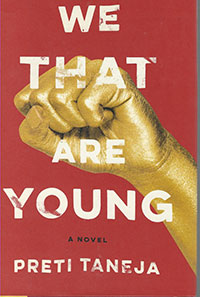 “We That are Young” (490 pages, $27.95) by Preti Taneja; published by Alfred A. Knopf (www.aaknopf.com)
“We That are Young” (490 pages, $27.95) by Preti Taneja; published by Alfred A. Knopf (www.aaknopf.com)
If you are familiar with Shakespeare’s “King Lear,” then you will find the story similar, though set in modern India. Jivan Singh, bastard son of Devraj Bapuji, returns to his childhood home after 15 years in the United States – only to discover that the ageing patriarch of the Devraj Company he founded has unexpectedly resigned. Then there is Sita, Devraj’s youngest daughter, who flees – refusing to submit to the marriage her father wants for her. Meanwhile, Radha and Gargi, Sita’s older sisters, must deal with the consequences. Thus begins a fierce, deadly struggle for power, which spans from the luxury hotels and spas of New Delhi and Amritsar, the palaces, and slums of the fabled Napurthala, to Srinagar. The story, divided into five chapters (characters, rather), is related in meticulously written prose as the ever-expanding gap between the filthy rich and the extremely poor is laid bare before the reader. Be cautioned that like Salman Rushdie or Arundhati Roy novels, this one too requires attention and concentration, what with a complexly told storyline going back and forth and intertwined characters that will stoop to corruption, deceit and murder. Here are some catchy lines: “Confusion: the bastard half brother of chaos. Chaos: the torture instrument of forgetting.” “Sacrifice creates the heat that keeps the world turning. If no one sacrifices, the sun will not rise.” “Sin comes in many forms … It can be an act. Or a lack of action. It can be a lie or believing a liar. Doubt is one of the worst sins of all.” Be patient, take your time with the book and you will enjoy the nearly 500-page read. For a debut novel, Taneja shines even though the subjects (characters) are somewhat hollow and depressing.